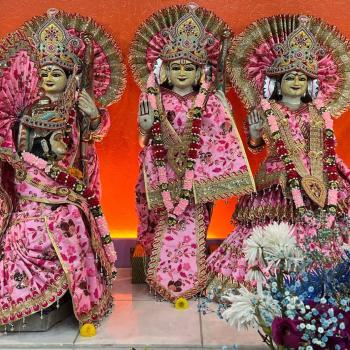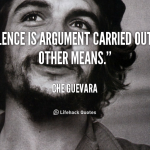Imagine for a moment, Pagans of all kinds having a heartfelt conversation with Muslims about the nuances between Shia and Sunni Islam on the one hand and between Reconstructionist Polytheism and Naturalistic Pantheism on the other. Or a similar conversation Mormons. Or with Evangelical Christians.
Imagine now that these conversations are not about finding common ground. Let me repeat that — imagine these conversations are not about finding common ground. Instead, imagine that the conversation aims at understanding of difference.
And now imagine that these conversations are respectful, constructive, and dialectical.
This is the goal of the Foundation for Religious Diplomacy (FRD), which promotes conversation between adherents of different religions that focuses on points of contention, but does so in a civil and respectful fashion, in order to foster understanding — not identification, but understanding of difference. Ideally, the parties to such a conversation would recognize that a person’s deeply held beliefs are not likely to change through argumentation. But they would also realize that we gain little by watering down our respective faiths to find some tenuous common ground. By passionately, but responsibly, sharing our respective irreconcilable truths, we might avoid the destructive conflict between religious communities that arises when we making uneducated assumptions about one another.
This form of form of dialog is called “honest contestation” or “peaceful co-resistance”. It seeks middle ground between disrespectful persecution and disrespectful tolerance. It applies a kind of Madisonian marketplace of ideas theory to interfaith, but without the zero-sum game. And it is the motivating idea behind the Foundation for Religious Diplomacy (FRD). David Dashifen Kees, the technical director for the Pagan Newswire Collective, a blogger at paganactivist.com, and the executive committee member for the International Pagan Coming Out Day, is currently working toward creating a Pagan chapter of the FRD, and I urge you to support him in this effort. You can read David’s guest contribution at The Wild Hunt here.
I was surprised at amount of resistance in the comments to David’s post. Much of it came from a few vociferous individuals who often seem to dominate these only conversations. While I was not too surprised by the comments of these individuals, I did find the opposition of Peter Dybing surprising. He was recently quoted on The Wild Hunt, in the context of the Pagan solidarity discussion, as saying, “A wide diversity of Pagan institutions are necessary as the glue that will bind us in our common effort to defend the rights of all belief systems.” It seems to me that a Pagan Chapter of the FRD would be one such Pagan institution to add the the “wide diversity”.
I want to briefly address some of the comments in general. The principle concern of many of the commenters seemed to be the invitation to any kind of interaction with Evangelicals. This suggestion was met with highly emotional reactions. My first point: While I certainly understand those responses on an emotional level, I believe that part of the process of our community growing up and being taken seriously as a religion is developing a willingness to engage in difficult dialogue, rather than sticking our heads back in the proverbial broom closet. Being able to have a genuine conversation with someone who wants to convert you is a sign of maturity. I’m not saying it’s easy. I’m saying it’s worth it.
This is not to say that that “honest contestation” is about evangelizing. And this brings me to my second point: “Honest contestation” does require a recognition that the practice of sharing one’s beliefs is at the core of certain faiths (notably Evangelical Christianity and Mormonism), but also recognizing that that does not need to be a threat to us. Apuleius Platonicus in particular seems to confuse the mission of the FRD with the tenets of the faith of its organizing members. The fact that someone embraces the “Great Commission” does not mean that the person is using “interfaith” is a code word for “proselytization”. (And it does not make them members of the Borg collective.) I have a certain bias here, having been Mormon and having been a Mormon missionary at one time. But I think this gives me a unique perspective, as I understand wanting to convert others (when I was Christian/Mormon) and also not wanting to convert anyone or anyone to try to convert me (now that I am Pagan).
Third point: I will not downplay the harm done by Christianity. I have experienced it myself. On the other hand, the demonization of Christianity and Christians does us Pagans no good, individually or collectively. As Pagans, we need to recognize that, just as Paganism may be seen as the Jungian Shadow of Christianity, so too do we Pagans have our own Shadows, Shadows that we project onto contemporary Christians. When someone invokes the Burning Times or other historical Christian persecution of Pagans in order to vilify contemporary Christians, this is often a defense mechanism that we use to hide open wounds in our own personal histories. In this way, the Burning Times is more personal myth than historical fact. This is not to downplay those personal woundings, which are real. But we need to own them. We need to own our Shadows and withdraw our projections in order to grow as individuals and as a community.
Fourth, the Pagan-Evangelical intersection got the most attention in the discussion following David’s post, and I think the breadth of the FDR’s vision was lost in the discussion. There are Buddhist, Eastern Orthodox, Hindu, Jewish, Mormon, Spiritual-but-not-religious, Roman Catholic, Russian Orthodox, Shi’a Islam, and Sunni Islam chapters, with Humanist, Protestant, Seeker, and Sikh chapters planned. Just imagine how Paganism might grow through honest interaction with these communities.
And, finally, if you have any doubt that “honest contestation” is possible, check out the New Wine, New Wineskins podcast conversation between Jason Pitzl-Waters, Mike Stygal, and John W. Morehead here, where they discuss the issues of evangelization, secular vs. multi-faith space, Christian privilege, and how to move Pagan-Christian dialog further.
Also check out:
“Perhaps the time has come for those supportive of more positive forms of engagement in the Pagan and Christian communities to work together in attempts at persuading their more conservative or fundamentalist members of the benefits of conversations involving religious diplomacy. Over time through relationships and demonstrations of good will we can come to view each other as ‘trustworthy rivals’ living in peaceful tension over our disagreements.”
- Paul Louis Metzger and John W. Morehead’s guest post at The Wild Hunt, charter members of the Evangelical chapter of the FRD:
“Our chapter aims to develop interreligious relationships and conversations in civility and without compromise with those of other religious and spiritual traditions. Our work in the chapter represents a new movement in Evangelicalism. The chapter seeks accuracy and fairness in understanding, and embodies a relational and dialogical approach, while addressing substantial differences in practice and belief between various religious and spiritual communities.”
Jason: “If Pagan dialogs with ‘missional’ Christians are going to bear fruit, we’ll have to find a way to communicate despite some core philosophical and theological differences. […] I would like to see more dialogs like this one. The more we communicate on equal footing, the better our chances of fostering real tolerance and understanding.”
- Morehead’s repudiation on his blog of countercult forms of boundary maintenance and apologetic in both Evangelical and Pagan forms, and his coverage of Paganism here.
Also check out:
Beyond the Burning Times: A Pagan and Christian in Dialogue, by Philip Johnson and Gus diZerega, and edited by John Morehead. See Jason Pitzl-Waters’ interview of diZerega here.
Connecting Christ: How to Discuss Jesus in a World of Diverse Paths, by Paul Louis Metzger and Thomas Nelson, which includes an article on Paganism and a response by Gus diZerega. While Metzger privileges his own Christianity, he actually lets representatives from each faith tradition he writes about get the last word. Jason Pitzl-Waters reviews the book here.














